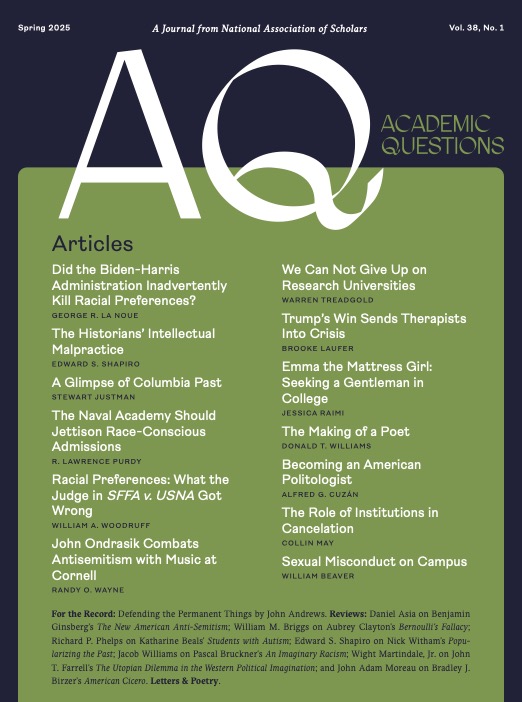This issue of Academic Questions tumbles off our presses in the midst of the great turmoil that President Trump has unleashed on American higher education. Colleges and universities have been ordered to divest their shares in DEI. They have been confronted with the demand that they recognize two and only two sexes. They face the heart-breaking reality that they may charge only fifteen percent for overhead on their federal research grants. They are being called on to enforce ordinary laws against assault, trespassing, and vandalism. They are being asked to protect Jewish students and faculty members from death threats and mayhem.
The executive orders (EOs) keep spinning out like receipts from a CVS register, so fast that no one can keep up. Columbia University, standing first in line with $400 million in research funding suddenly sequestered, attempted to staunch the hemorrhage by declaring that it would do all that was asked. The masked protesters would henceforth be de-masked. The thugs would be expelled.
But a day or two later, Columbia President Katrina Armstrong confidentially informed the faculty that they need not worry. She didn’t really intend to do what she said. I can’t know at this point which Katrina to believe. The story will have moved on by the time you read this. But I say with confidence that the credibility of America’s higher education leadership is in tatters, and no seamstress is so talented as to repair that garment.
As it happens, this issue has two articles about Columbia University, both composed and edited before the current troubles. Stewart Justman offers his memories of the Columbia he knew as an undergraduate in the 1960s and as a Ph.D. student in the 1970s. Justman is well aware of the contrast to the Columbia of the last few years, and the difference is etched in pain. It is also underscored by our other Columbia article, Jessica Raimi’s “Emma the Mattress Girl: Seeking a Gentleman in College.” For anyone new to this story, Emma was the undergraduate who asserted—with great implausibility—that she had been raped by a classmate at Columbia and that the University had declined to bring him to account. In protest she spent a whole academic year parading around campus with a mattress. That story is as much about Columbia’s protest theatrics as it is about Emma’s particular pathology.
But let’s give Columbia a rest. My custom in writing these introductions is to find a common thread for the articles at hand, but as this issue is fuller than usual, my task has ramified. I have turned for help to one of my great sources of inspiration, a slim paperback titled Bizarre Books: A Compendium of Classic Oddities by Russell Ash and Brian Lake, published in 2006, but containing forty-plus years of these two booksellers’ experience in searching out the books that were never at risk of appearing on best-seller lists. Here you will find Love Sonnets of a Hoodlum, Little Known Sisters of Well-Known Men, and Leadership Secrets of Attila the Hun, among other treasures. But today I want to summon the spirit of Phil Richards and John J. Banigan’s How to Abandon Ship (1942, second edition). In view of the year of publication, this was surely a practical volume to have at hand on your Atlantic crossing, but I am confident that the underlying principles would have been equally useful to Claudine Gay (Harvard), Liz Magill (UPenn), Martha Pollack (Cornell), Minouche Shafik (Columbia), among other captains who disembarked in 2024.
These seem to be harder than usual times to stay the course for university presidents. Perhaps these pages will help to explain why. George La Noue asks, “Did the Biden-Harris Administration Inadvertently Kill Racial Preferences?” and answers that president Biden February 2023 Executive Order expanding the federal mandate for racial equity prompted such “overreach” that intervention by the federal courts was inevitable.
Backfires come fast and furious. Edward Shapiro in “The Historians’ Intellectual Malpractice,” takes on the vote by members of the American Historical Association (AHA) to condemn Israel for responding to Hamas’ October 7th, 2023, atrocities by attacking Gaza. He warms to the subject of “settler colonialism,” which is one of those phrases that appeal to academics who have lost the ability to reason—and one of the reasons why college presidents might head to the lifeboats.
The military also occupies our next two articles. When the U.S. Supreme Court issued its decision in Students for Fair Admissions v. Harvard and the University of North Carolina, in which it struck down racial preferences in college admissions, Chief Justice Roberts included a footnote saying that the court was exempting the military academies from the new rule. Later another judge amplified that decision. We present articles by R. Lawrence Purdy and William A, Woodruff explaining that, at least in regard to the Naval Academy, the exception is a legal blunder.
The October 7 atrocity moved many NAS members to write. Randy O. Wayne found inspiration at Cornell where singer/songwriter John Ondrasik gave a concert of protest songs that touched on 9/11, the Russian invasion of Ukraine, and the American evacuation from Afghanistan. As well as October 7. Performed in the shadow of Hamas encampments at Cornell, this seemed an act of bravery worth noting.
Warren Treadgold is an indefatigable defender of the ideal of the research university and has long advocated that the institution be given a fresh start. In “We Can Not Give Up on Research Universities” he presents his case that conservatives need to get past their disappointments with the existing institutions and get behind the effort to establish new ones. Abandon one ship and climb onto another.
Brooke Laufer offers something I had not seen before: a diagnosis of the “collective psychological stance” of many therapists who have strayed out of professional neutrality into the realm of attempting to rescue patients from “wrong” political opinions. On first reading this submission I wondered how relevant it was to our academy-focused journal, but on a little reflection I concluded that the university is ground zero of this aberration.
In “The Making of a Poet,” Donald Williams looks back on his long academic career finding that his patience with the conflict “between the Ideal and the Real wears thinner with every passing year.” Which is to say he has wearied of “political correctness” and such vanities, and just wants his own space to admire truth, goodness, and beauty. I suspect readers will find a chord of sympathy with this self-announced Curmudgeon.
“Becoming an American Politologist” introduces a new word for me, but the author Alfred Cuzán explains it well. As a child he and his parents escaped Castro’s revolutionary Cuba and arrived in a round-about way in Miami. Cuzán’s eyes were opened by John Locke’s Second Treatise on Government and he found his academic path via public choice theory. This essay, like several others in this issue, is a kind of memoir, and a demonstration of the versatility of that form.
Colin May returns to these pages with a follow-up to his Fall 2024 article, “Confessions of the Cancelled.” In his new article, “The Role of Institutions in Cancellation,” which looks beyond the people seeking to cancel someone to the institutional authorities that make this form of aggression successful.
In “Sexual Misconduct on Campus: Betsy DeVos Had It Right,” William Beaver refreshes our memory of how far akilter higher education had gone in the Obama years in turning Title IX into a weapon by which aggrieved women and transgender “women” could manipulate their institutions into unfair and inappropriate judicial findings. Secretary of Education Betsy DeVos brought some regulatory relief, but that was torpedoed by the Biden administration. The trump administration is off to a good start on this matter, but a great deal remains to be done. Abandon ship? Stay the course? Too soon to tell.
Those are our thirteen articles, but this issue contains a wealth of reviews as well and some classic poetry. Of the reviews, I will single out two. William Briggs reviews a work on statistics, which I fear might be overlooked by the storm-tossed, weary reader. Don’t let that happen. Briggs, who styles himself as “Statistician to the Stars!” is a delightful writer who will make you more interested in statistics than you ever thought possible.
Jacob Williams’s review of Pascal Bruckner’s Imaginary Racism deserves attention both for the reviewer, a young doctoral candidate at Oxford who has appeared in these pages before, and for the author. Bruckner is a French philosopher who I first encountered in his book The Fanaticism of the Apocalypse, about why people are attracted to climate change catastrophism. I came to his new book primed by his last four and eager to win him new American readers. Williams is not quite the enthusiast I am, but that’s proper for a reviewer.
This volume wraps up with a suite of poems, old and new. Shakespeare’s’ “When to the sessions of sweet silent thought,” (Sonnet 30) sets the tone; Wordsworth’s “Milton thou shouldst be living at this hour” (London, 1802) likewise rescues a ray of hope from the prevailing gloom; and Dickenson’s “I years had been from home” speaks of the fear of going back. Our living poet who appears here often answers all three with her own memory of a Great Companion long gone, with whom she is now “amnestied.”
Let us pray for amnesty for our poor beleaguered culture that has suffered so much at the hands of its supposed guardians.
Peter Wood is president of the National Association of Scholars and editor-in-chief of Academic Questions.
Photo by unknown author - https://www.flickr.com/photos/joegratz/83460811/, from the 1964 yearbook of St. Lawrence University, CC BY 2.0, https://commons.wikimedia.org/w/index.php?curid=1496748













